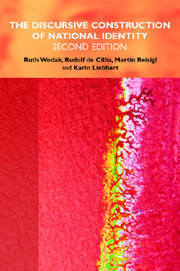Book contents
- Frontmatter
- Contents
- Preface to the Second, Extended Edition
- Acknowledgements
- 1 Introduction
- 2 The Discursive Construction of National Identity
- 3 On Austrian Identity: The Scholarly Literature
- 4 The Public Arena: Commemorative Speeches and Addresses
- 5 Semi-Public Discussions: The Focus Group Interviews
- 6 Semi-Private Opinions: The Qualitative Interviews
- 7 Conclusion: Imagined and Real Identities – the Multiple Faces of the homo nationalis
- 8 The ‘Story’ Continues: 1995–2008
- Appendix 1 Speeches Studied in Chapter 4
- Appendix 2 Speeches and Interviews Studied in Chapter 8
- Bibliography
- Index
4 - The Public Arena: Commemorative Speeches and Addresses
Published online by Cambridge University Press: 12 September 2012
- Frontmatter
- Contents
- Preface to the Second, Extended Edition
- Acknowledgements
- 1 Introduction
- 2 The Discursive Construction of National Identity
- 3 On Austrian Identity: The Scholarly Literature
- 4 The Public Arena: Commemorative Speeches and Addresses
- 5 Semi-Public Discussions: The Focus Group Interviews
- 6 Semi-Private Opinions: The Qualitative Interviews
- 7 Conclusion: Imagined and Real Identities – the Multiple Faces of the homo nationalis
- 8 The ‘Story’ Continues: 1995–2008
- Appendix 1 Speeches Studied in Chapter 4
- Appendix 2 Speeches and Interviews Studied in Chapter 8
- Bibliography
- Index
Summary
RHETORIC AND THE CONSTITUTIVE CONDITIONS OF POLITICAL ORATORY
The Commemorative Address as a Special Genre of Oratory
Classical rhetoric distinguishes three classes of genre: the judicial (genus iudiciale), the deliberative (genus deliberativum) and the epideictic (genus demonstrativum). According to the ideal-typical classification scheme, judicial oratory is focused temporally on the past, and thematically on justice or injustice, and its function is to accuse or defend. Deliberative rhetoric is associated with the future, thematically with expediency or harmfulness, and functionally with exhorting or dissuading. Finally, epideictic oratory is linked to the present, thematically to honor and disgrace and functionally to praise or blame (cf. Plett 1989, pp. 15f.).
With the exception of Friedhelm Frischenschlager's lecture ‘Austria in a Europe of Solidarity’, delivered before the SPÖ's Zukunftswerkstätte (‘Workshop for the Future’), 1 all the political addresses we analyse in this study were concerned with commemoration and may therefore be attributed to epideictic oratory in a broader sense. However, none of the three classes mentioned above occurs in pure form: the diversity of topics and temporal references usually results in the simultaneous presence of elements from all three oratorical categories within one and the same speech (on the close relationship between epideictic oratory and political speech, see Ottmers 1996, pp. 18–30).
Commemorative speeches are normally delivered on public days of remembrance, which are usually associated with the ‘magic of numbers’ (Huter 1994), and primarily serve to retrieve the past for the present.
- Type
- Chapter
- Information
- The Discursive Construction of National Identity , pp. 70 - 105Publisher: Edinburgh University PressPrint publication year: 2009

